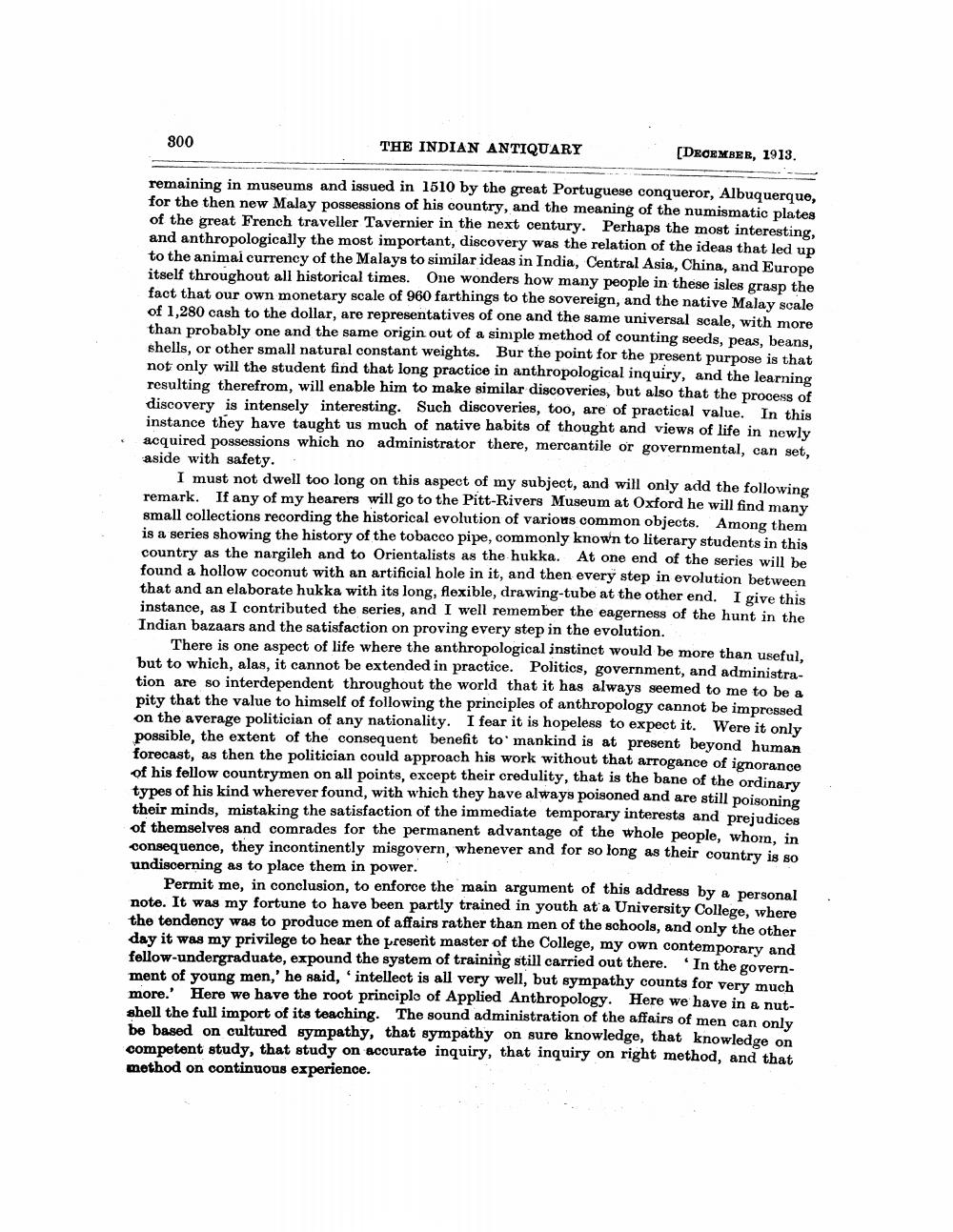________________
800
THE INDIAN ANTIQUARY
[DECEMBER, 1913.
remaining in museums and issued in 1510 by the great Portuguese conqueror, Albuquerque, for the then new Malay possessions of his country, and the meaning of the numismatic plates of the great French traveller Tavernier in the next century. Perhaps the most interesting, and anthropologically the most important, discovery was the relation of the ideas that led up to the animal currency of the Malays to similar ideas in India, Central Asia, China, and Europe itself throughout all historical times. One wonders how many people in these isles grasp the fact that our own monetary scale of 960 farthings to the sovereign, and the native Malay scale of 1,280 cash to the dollar, are representatives of one and the same universal scale, with more than probably one and the same origin out of a simple method of counting seeds, peas, beans, shells, or other small natural constant weights. Bur the point for the present purpose is that not only will the student find that long practice in anthropological inquiry, and the learning resulting therefrom, will enable him to make similar discoveries, but also that the process of discovery is intensely interesting. Such discoveries, too, are of practical value. In this instance they have taught us much of native habits of thought and views of life in newly acquired possessions which no administrator there, mercantile or governmental, can set, aside with safety. .
I must not dwell too long on this aspect of my subject, and will only add the following remark. If any of my hearers will go to the Pitt-Rivers Museum at Oxford he will find many small collections recording the historical evolution of various common objects. Among them is a series showing the history of the tobacco pipe, commonly known to literary students in this country as the nargileh and to Orientalists as the hukka. At one end of the series will be found a hollow coconut with an artificial hole in it, and then every step in evolution between that and an elaborate hukka with its long, flexible, drawing-tube at the other end. I give this instance, as I contributed the series, and I well remember the eagerness of the hunt in the Indian bazaars and the satisfaction on proving every step in the evolution.
There is one aspect of life where the anthropological instinct would be more than useful, but to which, alas, it cannot be extended in practice. Politics, government, and administration are so interdependent throughout the world that it has always seemed to me to be a pity that the value to himself of following the principles of anthropology cannot be impressed on the average politician of any nationality. I fear it is hopeless to expect it. Were it only possible, the extent of the consequent benefit to mankind is at present beyond human forecast, as then the politician could approach his work without that arrogance of ignorance of his fellow countrymen on all points, except their credulity, that is the bane of the ordinary types of his kind wherever found, with which they have always poisoned and are still poisoning their minds, mistaking the satisfaction of the immediate temporary interests and prejudices of themselves and comrades for the permanent advantage of the whole people, whom, in consequence, they incontinently misgovern, whenever and for so long as their country is so undiscerning as to place them in power.
Permit me, in conclusion, to enforce the main argument of this address by a personal note. It was my fortune to have been partly trained in youth at a University College, where the tendency was to produce men of affairs rather than men of the schools, and only the other day it was my privilege to hear the preserit master of the College, my own contemporary and fellow-undergraduate, expound the system of training still carried out there. In the government of young men,' he said, 'intellect is all very well, but sympathy counts for very much more. Here we have the root principlo of Applied Anthropology. Here we have in a nutshell the full import of its teaching. The sound administration of the affairs of men can only be based on cultured sympathy, that sympathy on sure knowledge, that knowledge on competent study, that study on accurate inquiry, that inquiry on right method, and that method on continuous experience.




